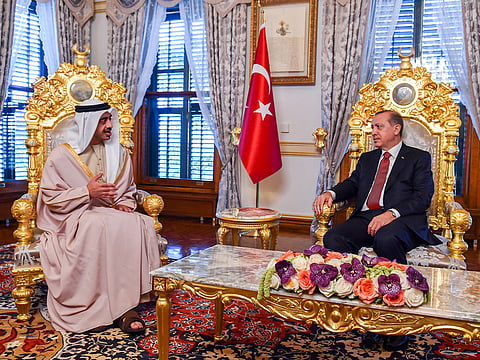UAE pledges to stand by Turkey amid regional challenges
Foreign minister praises Turkish people for rallying behind leadership during coup attempt

Ankara: Shaikh Abdullah Bin Zayed Al Nahyan, UAE’s Minister of Foreign Affairs and International Cooperation, stressed the importance of coordinating with Turkey to resolve the crises in the region, especially in Syria, Iraq, Yemen and Libya.
Speaking at a joint press conference with the Turkish Foreign Minister Mevlut Cavusoglu in Ankara on Sunday, Shaikh Abdullah said the recent meeting between the Gulf Cooperation Council (GCC) countries and Turkey in Riyadh was a crucial step to strengthen strategic ties, given the growing responsibilities of the two sides in addressing the challenges and facing the region and threatening its security and stability.
He pledged to stand by Turkey and emphasised the need to coordinate efforts in the face of regional challenges. He also highlighted the importance of the consultations, currently under way between the GCC and Turkey.
Shaikh Abdullah reiterated the UAE’s stance, in its rejection of the failed coup attempt in Turkey, saying he was pleased to see the Turkish people rallying behind their leadership.
On the commercial relations between the UAE and Turkey, Shaikh Abdullah referred to the huge potentials for increasing trade and joint investments between the two countries.
“We are proud of our Turkish brothers who live and work in the UAE. The UAE is currently home to over 10,000 Turkish citizens, who deserve to be thanked for their role in deepening ties between the two countries,” he added.
Shaikh Abdullah also thanked Turkey for supporting the UAE’s right to its islands, occupied by Iran, and for backing the Arab Coalition to support legitimacy in Yemen.
“Under such challenges, there is a pressing need to develop GCC-Turkish relations. However, opportunities abound in terms of economic and commercial cooperation. I am glad that Turkey and the GCC decided to resume talks on a free-trade agreement,” he said.
Cavusoglu said his country was looking forward to enhance ties with the UAE in all fields.
He also said that the UAE and Turkey share identical views on several regional and international issues of mutual interest, particularly, the situation in Syria, Iraq, Libya and Yemen.
During his stay, he visited the mausoleum of Mustafa Kemal Ataturk, the founder and first president of the Turkish Republic, in Ankara, where he laid a wreath and signed the visitors’ book.
Sign up for the Daily Briefing
Get the latest news and updates straight to your inbox



